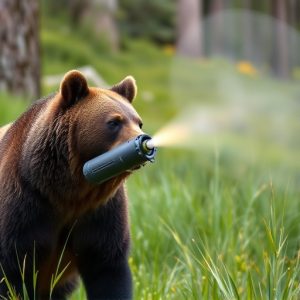Capsaicin-Based Bear Protection: Effective Deterrents and Safety Tips
Understanding bear behavior is crucial for outdoor safety in regions with aggressive bear population…….
Understanding bear behavior is crucial for outdoor safety in regions with aggressive bear populations. Bears become aggressive due to perceived threats or protecting food sources. A capsaicin-based bear repellent, derived from chili peppers, is an effective deterrent. The 10% to 20% capsicum concentration disrupts a bear's sensory perception, repelling them without harm. DIY high-concentration capsicum repellents can be created using fresh chili peppers and carrier oils. Combining noise-making tactics with proper food storage practices further enhances safety in bear country. Regular application and awareness of local capsaicin concentrations are key to enjoying these environments securely.
In areas inhabited by aggressive bears, understanding their behavior and implementing effective prevention measures is crucial for outdoor safety. This article explores a powerful natural deterrent: high-concentration capsicum (capsaicin) bear repellents. We delve into the science behind capsaicin’s efficacy, providing practical guidance on creating and applying these deterrents. Additionally, we discuss broader prevention strategies and safe outdoor practices to minimize bear encounters and ensure a secure outdoor experience.
- Understanding Bear Behavior and Aggression
- The Science Behind Capsaicin and Its Efficacy
- Creating and Applying a High-Concentration Capsaicin Bear Repellent
- Additional Prevention Measures and Safe Outdoor Practices
Understanding Bear Behavior and Aggression
Understanding bear behavior is crucial when it comes to outdoor safety, especially in areas known for aggressive bear populations. Bears are wild animals with complex instincts, and their aggression can often be a reaction to perceived threats or a desperate attempt to protect food sources. Knowing what triggers bears to become aggressive can help hikers and campers prevent such encounters. For instance, mothers with cubs are extremely protective and will defend their young against any perceived danger. Similarly, bears attracted to food leftovers or scent markings may become habitual visitors to campsites, leading to aggressive behavior if they feel trapped or threatened.
One effective way to deter bears is through the use of bear repellent sprays containing capsaicin, a compound derived from chili peppers. The capsaicin concentration in these repellents plays a significant role in their effectiveness. Higher concentrations can provide longer-lasting protection by not only repelling bears but also masking human scent, reducing the likelihood of attracting them in the first place. This knowledge empowers outdoor enthusiasts to take proactive measures when venturing into bear country, ensuring a safer and more enjoyable experience amidst nature’s beauty.
The Science Behind Capsaicin and Its Efficacy
The active ingredient in many bear repellent products, capsicum, has gained attention for its effectiveness against aggressive bears. This natural compound is derived from chili peppers and is known for its pungent taste and strong odor. The science behind capsaicin’s success lies in its ability to disrupt a bear’s sensory perception. When applied topically, the capsaicin concentration in bear repellent creates an unpleasant experience for the animal, triggering a flight response. This is particularly effective against defensive bears that are not seeking conflict but may be provoked by human presence.
Research has shown that a specific capsaicin concentration, typically around 10% to 20%, can significantly deter bears without causing significant harm. The mechanism involves binding to pain receptors in the bear’s nose and eyes, leading to temporary disorientation and an instinctive desire to retreat. This natural approach offers a safer alternative to traditional repellents, ensuring that humans and wildlife can coexist more harmoniously while outdoor activities are enjoyed.
Creating and Applying a High-Concentration Capsaicin Bear Repellent
Creating a high-concentration capsicum (capsaicin) bear repellent is an effective and natural way to deter aggressive bears from approaching your outdoor space. Capsaicin, the active ingredient in chili peppers, is known for its pungent and irritant properties that can effectively ward off bears without causing them lasting harm. Start by extracting capsicum from fresh chili peppers; you can do this at home using a food processor or blender to create a paste. Then, mix the paste with a carrier oil like vegetable or neem oil to dilute it for safe application. The key is to maintain a high capsicum concentration—typically around 10%—to ensure its effectiveness.
Apply the repellent liberally around areas where bears are known to frequent, focusing on paths, campsites, and food storage zones. Reapply after rainfall or every few days to maintain optimal protection. Remember, consistency is crucial; bears can quickly become accustomed to repellents, so regular use will help keep them at bay. By using this DIY approach, you’re not only armed with a powerful bear deterrent but also contribute to minimizing the use of synthetic chemicals in the environment.
Additional Prevention Measures and Safe Outdoor Practices
In addition to carrying bear spray, there are several other prevention measures and safe outdoor practices to consider when venturing into bear country. One effective strategy is to make noise while hiking or camping to deter bears from approaching unexpectedly. Bears have excellent hearing, so talking, singing, or playing music can help keep them at a distance.
Another crucial aspect is proper food storage. Always store food in airtight containers or hang it out of reach in a bear-resistant bag. Avoid cooking or eating near your sleeping area and clean up any crumbs or spills immediately. Maintaining a clean camp and securing food properly reduces the likelihood of attracting bears to your location. Additionally, be mindful of your surroundings; stay alert and look for signs of bear activity before setting up camp. Knowing the local Capsaicin concentration in bear repellents can also guide your decision-making process in choosing an effective deterrent.
In conclusion, understanding bear behavior and utilizing the science behind capsaicin offers a powerful solution for outdoor protection against aggressive bears. A high-concentration capsaicin bear repellent, when correctly created and applied, can significantly deter bears due to its potent spice level. Additionally, adopting safe outdoor practices and combining them with preventive measures like proper food storage and noise awareness further reduces the risk of bear encounters. By implementing these strategies, individuals can enjoy the outdoors while minimizing potential conflicts with these majestic yet potentially dangerous animals. Remember, knowledge and preparation are key to ensuring a safe and enjoyable outdoor experience in bear country.


